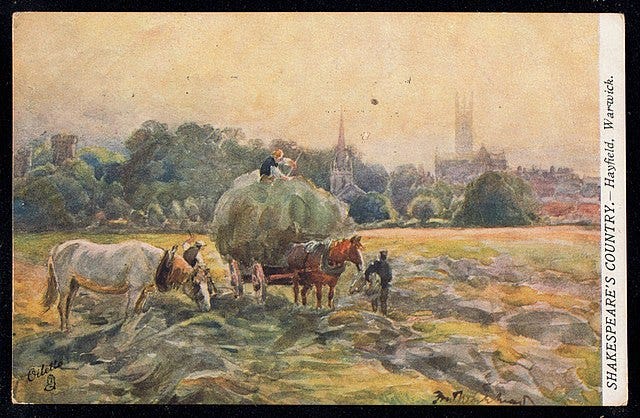Building an economy on spilt grease and wet hay
Trade barriers are having the impacts liberals expected. Those who denied it are suffering
“Protective tariffs make more work, in the sense in which the spilling of grease over her kitchen floor makes more work for the housewife, or as a rain that wets his hay makes more work for the farmer.”
American economist Henry George gained fame for his ability to explain complex economic concepts in terms that his 19th century audiences could easily understand, and this note - from his work ‘Protection or Free Trade’, is among the finest examples.
George’s accomplishment in the work, though, is not just to explain why protection was inefficient, but also to explain why it was still popular. He continues to explain that
“A rain that wets his hay is to the farmer clearly an injury; -but is it an injury to the laborer who gets by reason of it a day's work and a day's pay that otherwise he would not have got? The spilling of grease upon her kitchen floor may be a bad thing for the housewife; but to the scrubbing woman who is thereby enabled to earn a needed half-dollar it may be a godsend”
Introducing friction into trade relations is popular partially because of the mindset that the more work is available, the better. When prices are stable, for most people the limiting factor in what they can purchase and consume is how much work they can get and what they can be paid for it. It is only when the means to maximize available work turns out to also raise prices - and by introducing inefficiencies to the economy, these means, be they tariffs, immigration restrictions, or other measures, almost always do - that the true cost is understood.
This is what most of the wealthy world is currently experiencing. The US and UK have near-record low unemployment rates, and Germany’s 3% rate is lower still. However, all are facing rising prices that have wiped out any wage gains from low unemployment.
Germans know quite clearly why this is happening - sanctions on Russia and retaliatory limits on gas exports have hit the country’s productive capacity, driving up prices for energy and, with it, everything else, as well as complicating supply chains. In the US, the trade war with China has had the predictable effect of driving down bilateral trade and thus reducing efficiency - impacts which COVID lockdowns and new export controls are likely to exacerbate. Moreover, several years of depressed immigration likely made the supply side issues in the US more acute, as well.
And the UK? Well, the severe cost of living crisis there, complete with double digit inflation, likely has several causes. But it’s impossible to ignore the role Brexit has likely played. The UK economy was for decades part of the largest trade bloc in the world, and it will take more than a couple years to adjust. Perhaps the biggest blow to UK stability, however, is that British voters were sold a promise that they could leave the EU without cost - indeed, it was supposed to free up more money for the NHS while giving Britain control over its immigration!
That increasing the trade friction between the UK and its neighbors would lead to higher prices and slower economy growth is no surprise to most economists. However, the public by and large does not trust economists, and both Tory and a fair number of Labour politicians were either happy to repeat Leave claims or at least reluctant to refute them.
This leaves the UK leadership in the unfortunate position of having to explain to its people why, despite what they were promised, they now face a future of less material wealth. The hay has been rained on, grease (somewhat gleefully) spilled on the floor, and now the unpleasant task of dealing with it has to be faced. How the British political system manages this remains to be seen.
None of this is to say that the most efficient possible trade system must be maintained at all costs! German voters, for example, largely accept the costs of their policy toward Russia - and admirable position. But pretending that there are no costs, or acting like the jobs in grease cleaning will make up for the lost trade opportunities, is a recipe for disappointed voters and political hardship.




Yep. Perfectly stated. I said at the time -- actually, in criticizing those who opposed Brexit -- that it is perfectly rational to vote for more political independence and less material wealth. But, as you point ouy, no one in Britain seem to be honest about what would happen.